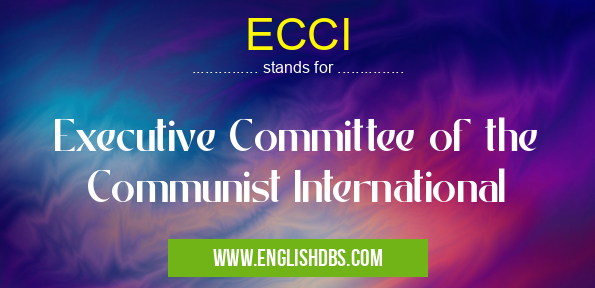What does ECCI mean in POLITICS
The Executive Committee of the Communist International (ECCI) was a political organization founded in 1919 by the Bolsheviks party of Russia and was headed by Vladimir Lenin. The purpose of the ECCI was to serve as an international coordinating body for the spread of revolutionary socialism. It had representatives from various countries, including China, India, Bulgaria, Germany and France. The ECCI's primary mission was to organize armed uprisings throughout Europe and around the world and to promote Marxist ideology on a global scale. The ECCI also helped to coordinate tactics between different Communist parties in different parts of the world.

ECCI meaning in Politics in Governmental
ECCI mostly used in an acronym Politics in Category Governmental that means Executive Committee of the Communist International
Shorthand: ECCI,
Full Form: Executive Committee of the Communist International
For more information of "Executive Committee of the Communist International", see the section below.
» Governmental » Politics
What does ECCI mean?
ECCI stands for Executive Committee of the Communist International. It is a committee made up of representatives from various countries that served as an international coordinating body for spreading revolutionary socialist ideology around the world during the early 20th century when communism first emerged as a powerful ideological force in many parts of Europe.
Role
The main objective of ECCI was to facilitate coordination between different communist parties operating within particular countries or regions, so that they could work together more effectively in pursuit of their shared agenda: replacing capitalist economic systems with socialist ones across Europe and beyond. Additionally, it sought to promote Marxist thought on a global level through publication of books, articles and pamphlets, as well as actively organizing armed uprisings throughout Europe and other regions where necessary in order to put its goals into practice.
Impact
ECCI played a significant role in promoting Marxism-Leninism internationally during this period in history, helping to make Communism an influential philosophical force in numerous nations at the time. It also helped foster cooperation amongst Communists who may have otherwise been divided without such coordination – enabling them to accomplish more together than they would have otherwise been able to alone. This influence has endured long after its dissolution following World War II; indeed many modern incarnation Communism still draw inspiration from its teachings today.
Essential Questions and Answers on Executive Committee of the Communist International in "GOVERNMENTAL»POLITICS"
What is the Executive Committee of the Communist International?
The Executive Committee of the Communist International (ECCI) was a global organisation founded in 1919 to coordinate activities and promote revolutionary socialism across borders. It helped to shape many socialist and communist movements around the world during its existence until it was dissolved in 1943.
What were the goals of ECCI?
The goals of ECCI were to facilitate international collaboration among various communist factions, spread communist ideology, develop revolutionary strategy, further international solidarity and expansion of an international proletarian revolution.
Who founded ECCI?
The Executive Committee of the Communist International was founded by Vladimir Lenin at the Second Congress of the Communist International (Comintern).
What countries were members of ECCI?
Various countries including Germany, Canada, China, Czechoslovakia, France, India, Italy, Japan, Mexico, Poland and United States were associated with or had representatives involved in ECCI meetings.
What happened during the "Third Period" under ECCI?
During its Third Period from 1928-1934 ECCI adopted a sectarian approach which pushed for a radicalised approach aimed at breaking away from other left-wing parties that had previously been seen as allies. This period saw an increase in factionalism within international communism.
How did WWII affect ECCI's operations?
World War II put considerable strain on international revolutionary organisations such as ECCI due to its divided loyalties between support for nations engaged in war against one another but also support for their individual struggles against fascism. This pressure eventually led to its dissolution in 1943.
Was there a successor organisation to ECCI?
Yes, in 1943 after its dissolution it was replaced by Information Bureau of the Communist and Workers Parties (or Cominform) which aimed to provide a unified information centre for all major political groups around Europe as well as serve as an advisory body for communists involved in anti-fascist resistance during World War II.
How did Joseph Stalin influence decisions made by ECCI?
During his rule Joseph Stalin exerted significant influence over decisions made by the Executive Committee of Communist International (ECCI). Notable examples include Stalin's prerogative over decisions regarding foreign policy and trade agreements with capitalist nations despite being vehemently opposed by Leon Trotsky who favoured ‘permanent revolution’ instead. Stalin’s influence extended beyond ideological matters too – often reaching into matters such as personnel appointments even outside Soviet Union's official presidium membership in foreign countries.
